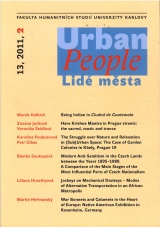Being Indian in Ciudad de Guatemala
DOI:
https://doi.org/10.14712/12128112.3560Klíčová slova:
Ciudad de Guatemala/Guatemala City, Indians, Ladino People, ethnicity, urban anthropologyAbstrakt
This article first briefly presents the history of the Guatemala main cities in the context of the process of dichotomization of Guatemalan society, which is nowadays divided into two equally numerous ethnic and social groups: native (Indian), represented mainly by the most numerous Mayan ethnic groups (Quiché, Kaqchikel, Keqchí, Mam), and Ladino (mixed white/Creole-Indian). In the next part, I discuss several sociological and anthropological works on Guatemala City. Finally, I address how the forming process of “being Indian” in the capital of Central American Guatemala has been constructed. Here I combine a review of the vast ethnographic work of Guatemalan social anthropologist Manuela Camus with my personal reflection.
Stahování
Publikováno
Jak citovat
Číslo
Sekce
Licence

Tato práce je licencována pod Mezinárodní licencí Creative Commons Attribution-NonCommercial-NoDerivatives 4.0.


